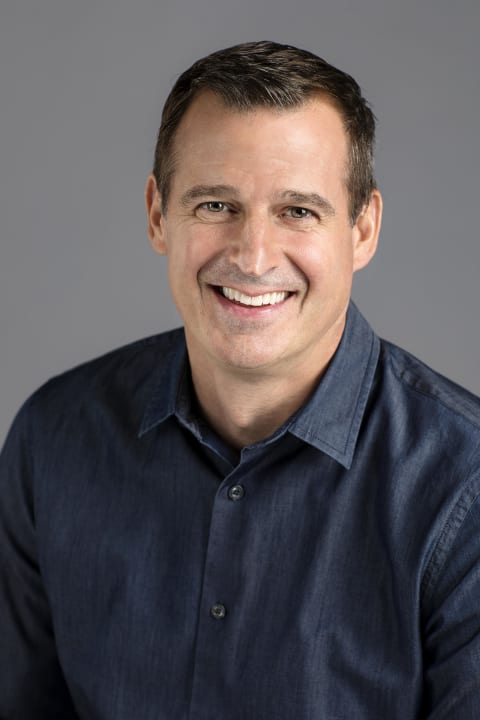
Moments That Shape Us | Michael O'Neil
Story 41
By Kirsten Cutler
It was a surprise that changed the trajectory of his life. Engaged to be married and in the throes of graduate school at age 28, Michael O’Neil found himself in a hospital bed awaiting biopsy results. Seven days post-surgery, Michael was growing desperate for answers from his doctors and nurses.
“I remember saying, ‘I know you guys are in a hurry, but is there any way I can get my hands on something to read or something to watch?’ And they said, ‘Well, we have education on channel 12 on the TV." When he navigated his way to channel 12, Michael didn’t find any relevant information or answers.

“At that moment,” Michael remembers, “I thought, ‘This cannot be the way that patients who come here for life-defining moments are informed about their conditions. It can't be.’"Michael’s dilemma compelled him to action.
“I literally drew on a napkin – which sounds so cliché – on my bed tray, a picture of a TV and the first GetWellNetwork system, which was, ‘My Education, My Health, My Team, My Art Team.’”
When his law school roommate came to visit that night, the idea took on more shape. “I said, ‘Here's what we're going to do. We’re actually going to turn these TVs into desktops and make them desktops for patient care.’"

That’s exactly what Michael went on to do: The idea he formed in his personal moment of crisis became the concept behind the GetWellNetwork.
“The mission of GetWellNetwork has not changed since we wrote the business plan on August 1st of the year 2000,” Michael says. “It was to help people take a more active role in their health journey.”
Michael draws on his personal experience to define what this means.
“There’s a moment where you begin to realize that the results of a blood test are less important than the empowerment that [comes from] guiding the journey,” he explains. “It means, ‘I've got my head and my soul around this, and I'm actually managing it according to the way that I actually want to manage it.’ If we can find our way to that as a way care gets delivered, I think it's a fundamental shift in outcomes of care.”
“At the most fundamental level, mission matters in healthcare, and you can't fake it.”
Michael’s idea over 21 years ago has evolved into lifetime pursuit to improve healthcare, and in a moment full of challenges, dire predictions and disruptions, he says holding on to values – in life and in business – is just as important as embracing change.
“Healthcare is truly unique in that trust is a centerpiece of everything that we actually do,” Michael explains. “At the most fundamental level, mission matters in healthcare, and you can't fake it.”
“Our health systems are built by, with, and for people who were born and trained to deliver care to people,” he adds. “I think that health systems who can double down on values but lean into disruption innovation are in an unbelievably exciting place, and I think Adventist Health is right at the heart of it.”
Related stories

Todd Reese

Robert Ferguson

Chris Garcia

Mark Mitchelson

Randi White

Sarah Gutierrez

Cory Ferrier

Juan De La Cruz

Central Coast Service Area | Celebration Event

Mara Bryant

Diana Erdmann

Gary Obreque

Wes Rippey

Adam Lee

Erasmo Cortez

Camie Overton

Jayant Eldurkar

Heather Thompson

John Hay
